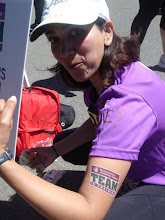Just as it is important to have a child of your own if you are a pediatrician, NOW, I do really think that it is absolutely important to add cancer cargiving in the training for oncologists. I would not wish cancer on anyone but if you do not know and are not in the receiving or caring end of cancer there is really no way of understanding your role as an oncologist.
If you are an electrician, you have hands on training, if you are a hair dresser or colorist you have worked on real hair, if you are a surgeon you have operated on. If you are an oncologist do you really know what all those rounds of chemo are doing to the child? To their family?
One would argue that the oncologist is getting hands on training by working with so many different patients. But is that training or is that care, or is that doing your job and crossing your t's and dotting your i's? They use the same drug on all the kids that have e.g. ALL. Whether it is a 3 year old boy or a 2 year old girl. Each body is different and each body will handle the medicine in it's own unique way.
When they send a 9 year old home and he is expected to take almost 22 pills in 1 day, Have you tried to take 22 pills in a day? In their training they should be given 22 sugar pills to take at precise times, with food, without food, just before going to bed, make sure they haven't had milk 30 minutes prior. 4 of these 22 pills are so big that even an adult throat would choke on it and gag so cut the pill in half so now we are saying 26 pills a day.
How about constantly watching for a fever, having a bag packed and ready incase you have to run to the hospital at wee hours.
How about dropping everything, even your own special b'day or weekend getaway and running to the hospital to be told you cannot go home now that you have spiked a fever even though we have no idea what it is and we won't know for the next 72 hrs.
Following a protocol and administering medicine is a very small part of treating a child with cancer, learning to treat the whole child is the key training that is lacking in modern medicine. The doctors are so intent on removing the cancer from the child's body that they forget to think about what will be left in that body once the treatment is done. What might be left is an empty shell and a reminder to the parents that they were given all the paperwork that talked in great detail about all the side effects that can occur.
Following a protocol and administering medicine is a very small part of treating a child with cancer, learning to treat the whole child is the key training that is lacking in modern medicine. The doctors are so intent on removing the cancer from the child's body that they forget to think about what will be left in that body once the treatment is done. What might be left is an empty shell and a reminder to the parents that they were given all the paperwork that talked in great detail about all the side effects that can occur.


No comments:
Post a Comment